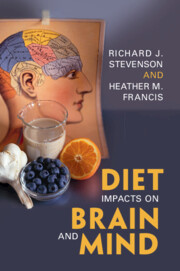Book contents
- Diet Impacts on Brain and Mind
- Diet Impacts on Brain and Mind
- Copyright page
- Contents
- Figures
- Tables
- Preface and Acknowledgements
- Chapter 1 Introduction
- Chapter 2 Pregnancy, Infancy and Development
- Chapter 3 Acute Effects of Food Intake
- Chapter 4 Chronic Effects of Food Intake
- Chapter 5 Dietary Neurotoxins
- Chapter 6 Neuroprotective Effects of Diet
- Chapter 7 Food-Related Drugs and Food as a Drug
- Chapter 8 Starvation and Caloric Restriction in Adults
- Chapter 9 Essential Nutrient Deficiencies in Adults
- Chapter 10 Implications and Conclusions
- References
- Index
Chapter 3 - Acute Effects of Food Intake
Published online by Cambridge University Press: 02 February 2023
- Diet Impacts on Brain and Mind
- Diet Impacts on Brain and Mind
- Copyright page
- Contents
- Figures
- Tables
- Preface and Acknowledgements
- Chapter 1 Introduction
- Chapter 2 Pregnancy, Infancy and Development
- Chapter 3 Acute Effects of Food Intake
- Chapter 4 Chronic Effects of Food Intake
- Chapter 5 Dietary Neurotoxins
- Chapter 6 Neuroprotective Effects of Diet
- Chapter 7 Food-Related Drugs and Food as a Drug
- Chapter 8 Starvation and Caloric Restriction in Adults
- Chapter 9 Essential Nutrient Deficiencies in Adults
- Chapter 10 Implications and Conclusions
- References
- Index
Summary
This chapter explores the acute effects of food intake. The first part (Section 3.2) deals with whole meals. Having breakfast may have some limited cognitive benefits, but confounds (the link between breakfast and socio-economic status) and absence of a theoretical rationale are problematic. There were few consistent effects linked with other meal-types, except lunch, which is linked to drowsiness. The second part (Sections 3.3–3.4) considers the impact of glucose on the brain and its basis, finding acute administration assists hippocampal-dependent learning and memory and executive function, but with no impact on self-control. Section three examines if dietary manipulation of amino acids can be used to affect specific monoamine neurotransmitter systems, via loading or depletion. Tryptophan (serotonin precursor) is best studied, with loading generating fatigue and depletion lowering mood in at-risk individuals. Tyrosine (dopamine precursor) loading has facilitative effects on working memory, but the depletion findings are ambiguous. There is little data on histidine (histamine precursor).
- Type
- Chapter
- Information
- Diet Impacts on Brain and Mind , pp. 63 - 106Publisher: Cambridge University PressPrint publication year: 2023



